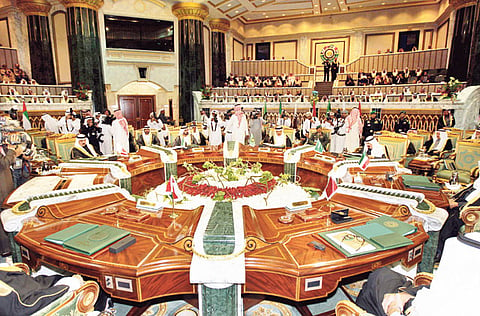GCC union will keep region stable
Political unification preceded by economic integration will create an entity capable of handling strategic issues

Saudi King Abdullah Bin Abdul Aziz's proposal at the Riyadh summit of the GCC leaders last week to move beyond cooperation to the ‘union' has the making of a major initiative in creating a new and lasting balance of power in the troubled macro-region to which the GCC states belong.
The world awaits further elucidation of the idea of a "single entity" in March 2012 as the present situation is a trifle paradoxical. Despite great strides since its inception, the GCC's economic integration is still a work in progress. In other models such as the EU, a higher degree of economic harmonisation preceded political unification. The Riyadh declaration may, therefore, seem somewhat premature to outside observers. Viewed in a political perspective, however, the project is a timely response to a fast changing strategic landscape.
History got accelerated in the region both because of its internal dynamics and protracted foreign interventions. The Iranian revolution is an obvious example of the former while the monumental changes wrought by the US-led invasion of Iraq in 2003 illustrate the latter.
More recently, the so-called Arab Spring has introduced yet another factor that needs to be fully assimilated in what the Riyadh declaration defines as "the process of development and comprehensive reform", while "maintaining security, stability and national cohesion and social welfare". They have not experienced the volatility and violence witnessed in a number of other Arab states and are, therefore, in a unique position to craft a paradigm of sufficient, if calibrated, change. Needless to say that they would succeed better if they act in concert as a single entity.
One may pause to discuss briefly another phenomenon to which the region is subject. While western polities steadily advance towards closer integration, several orientalists, exemplified by Bernard Lewis, have advocated splitting of Middle Eastern states into unviable statelets. Iraq is often flagged for fission into two or three de facto or de jure sovereign entities reflecting ethnic and sectarian ‘realities'.
Whether intended or not, the proposed union would, in effect, challenge such divisive thoughts. Interlocking webs of Arab ‘communities' in the GCC area, North Africa and eastern Mediterranean may serve the larger Arab nation better than the rather hasty unions of revolutionary states in an earlier era.
In a rational analysis, destruction witnessed in Iraq and Afghanistan provides a compelling argument for averting yet another violent denouement in Iran-related issues. As a former ambassador to that country when its revolutionary ethos was more evangelical and it was fighting a long war with Iraq, I am all too aware of a tendency in Tehran to believe in a state of siege. Iran is now pragmatic enough to seek better relations with the GCC states even as it looks at them through the prism of its hostile relations with Washington. The ill-conceived political engineering in Iraq has enabled it to make geo-political gains that can fuel illogical ambitions. This demands vigilance by the GCC states though a dialogue still offers the best route to a settlement of differences. India has helped diversify Iran's commercial outreach and Tehran has executed projects with Central Asian states that increase its options. Nevertheless, the Arab states of the Gulf are still its lifeline.
There will be greater dangers to the region if Iraq explodes under ethnic and sectarian pressures. Disproportionate use of force in Syria may also entail its crisis flowing beyond its borders. Then Israel's intransigence, especially its unfettered colonisation of Palestinian land is building a head of steam that would inevitably push Arab masses towards a more proactive response.
Saudi diplomacy remains engaged with unfolding circumstances subtly and of late, Qatar and UAE have played a stronger role. The proposed union would make it easier to develop a collective response to the present and future challenges.
The GCC states possess a vast area bearing a major component of global energy resources; they have a small population and an economy employing a disproportionate number of expatriates. The union would be an asset in dealing advantageously with large states to the east that have issues amongst themselves.
Pakistan, a nuclear state, is a kindred buffer to all kinds of eastern winds but is at present hobbled by its own crises. The GCC union should fortify mutual security and stability, especially with increased direct GCC investment in it. India is an emerging power expected by the West to counter-balance China, strategically and economically. This will generate tensions particularly as India fulfils its ambition to have blue-water Navy projecting power in a vast stretch of water, including the Gulf and the Gulf of Oman.
Before long Chinese air craft carriers would also be seen in this neighbourhood. None of these eastern powers are hostile to the GCC states but relations with them have to be managed with aplomb through periods when they engage in economic and political competition backed by huge armies of land, air and sea.
King Abdullah of Saudi Arabia is carrying forward the visionary tradition of late King Faisal; it is time to fast-track the GCC union to enhance regional security and development.
Tanvir Ahmad Khan is a former ambassador and foreign secretary of Pakistan.

